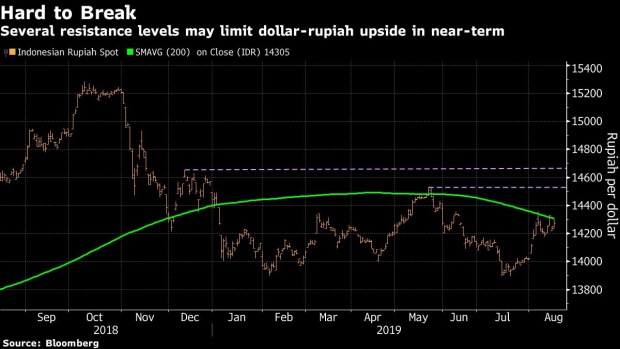Aug 17, 2019
Bank Indonesia Seen Keeping Rupiah Bears at Bay as EM Risks Rise
, Bloomberg News

(Bloomberg) -- Indonesia’s rupiah has braved headwinds both at home and abroad to escape largely unscathed in the recent emerging-market sell-off, and the nation’s central bank is largely to thank for that.
Bank Indonesia’s repeated interventions to maintain currency stability have helped soothe investor nerves, with the rupiah’s 0.8% loss this quarter making for the second-best performance among Asian EM currencies. Last year’s aggressive rate hikes mean rupiah-denominated government bonds continue to offer the highest yields among major regional markets, though global growth worries now seem to be weighing on demand at auctions.
As renewed uncertainty around the U.S.-China trade relations threatens to unleash more pain in markets, focus is turning to BI’s policy decision on Aug. 22, with expectations it will keep rupiah bears at bay by holding interest rates steady amid a pickup in EM volatility. The central bank cut the benchmark last month for the first time in almost two years.
“Despite recent easing and dovish rhetoric from Governor Perry Warjiyo, we expect the central bank to be on hold in terms of rate cuts given the recent upswing in pressure on the Indonesian rupiah,” according to an ING Groep NV report. “The stability of the nation’s currency will be integral in determining the timing of the next rate cut.”
BI will hold the seven-day reverse repurchase rate at 5.75% on Thursday, according to the median estimate in a Bloomberg survey of 10 economists. Even a cut to 5.50%, as predicted by some, will mean it remains the highest inflation-adjusted policy rate in the region, according to Citigroup Inc., which is forecasting a reduction.
With yields around the world tumbling to fresh lows with each passing day, the attractiveness of the 7.43% rate on the nation’s 10-year bonds is bolstered even as investors become wary about emerging-market assets.
Total Return
Investing in rupiah will earn more than 7%, including interest, by the second quarter of 2020, the best total return in Asia, according to estimates compiled by Bloomberg.
Southeast Asia’s largest economy is forecast to grow 5.3% next year, President Joko Widodo said Friday in his annual budget speech. That would be the fastest pace since 2013.
While global funds have been net sellers of rupiah bonds in August following last month’s easing, their net purchases of the securities so far in 2019 -- at $7.7 billion -- are set to be the second-highest in five years.
Technical indicators signal that the dollar-rupiah’s 200-day moving average is currently capping a rally in the currency pair, which was down 0.2% at 14,248 as of 3:45 p.m. in Jakarta on Friday. Its upside in the near term is also seen limited due to additional resistance layered between the May 22-high of 14,528 and the Dec. 11, 2018-high of 14,655.
Below are the key Asian economic data and events due this week:
- Monday, Aug. 19: Japan trade balance, Thailand GDP, New Zealand performance services index and PPI, Philippines BoP overall
- Tuesday, Aug. 20: RBA policy minutes
- Wednesday, Aug. 21: Australia skilled vacancies, New Zealand credit-card spending, South Korea PPI and first 20 days exports and imports, Thailand customs trade balance
- Thursday, Aug. 22: Bank Indonesia rate decision, Japan Jibun Bank PMIs
- Friday, Aug. 23: New Zealand 2Q retail sales ex-inflation, Japan CPI, Philippines budget balance, Singapore CPI
To contact the reporter on this story: David Finnerty in Singapore at dfinnerty4@bloomberg.net
To contact the editors responsible for this story: Tan Hwee Ann at hatan@bloomberg.net, Shikhar Balwani
©2019 Bloomberg L.P.